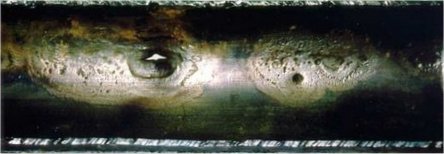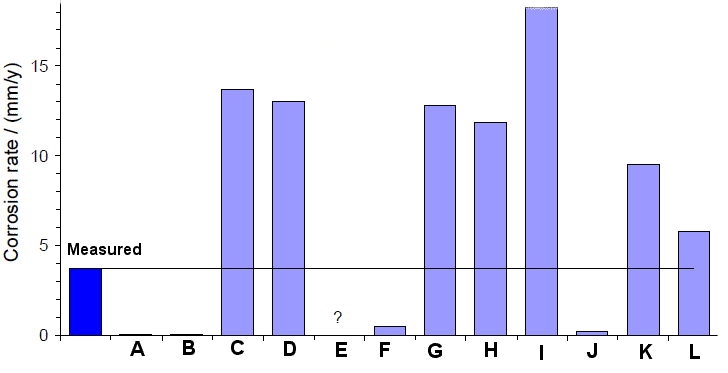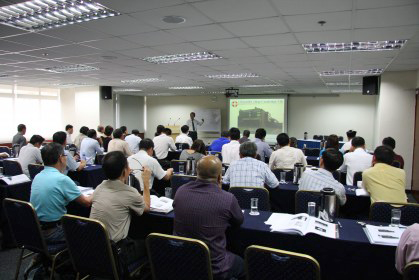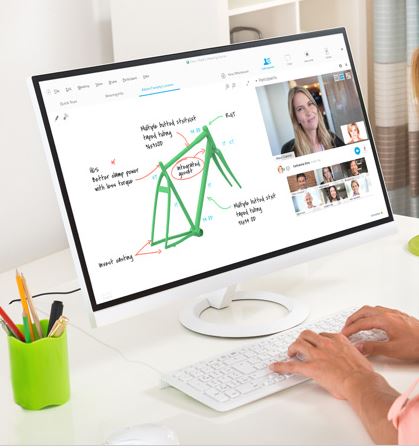|
Home | Consulting | Training | Expert Witness | Failure Analysis | Design Review | Corrosion Test | Corrosion Software | Protective Coatings | Materials Selection | Cathodic Protection | >>> | ||
|
CO2 Corrosion Modeling for the Prediction of Internal Corrosion in Oil & Gas Pipelines and Production Tubing |
||
|
Course Outline | Who Should Attend | Registration | In-House | On-Demand | Online Courses | PPT Slides+Testbank | Course List | Why WebCorr |
||
| Course Overview | ||
|
Carbon dioxide (CO2) corrosion is a recognized integrity threat worldwide. CO2 corrosion modeling has been used at both the design and operation phases of oil and gas pipelines and production tubing for the prediction of internal corrosion growth rates. Considerable gap exists between the prediction and the reality.
Since the classic carbon dioxide corrosion model published by C. DE WAARD and D. E. MILLIAMS in 1970s, more than a dozen of CO2 corrosion models have been developed over the past 40 years. Each of the model developers has incorporated their own laboratory and field data to produce a CO2 corrosion model.
The figure above shows a comparison of the measured corrosion growth rate and the corrosion growth rates predicted from twelve CO2 corrosion prediction models under a specific field condition.
None of the CO2 corrosion prediction models produced corrosion growth rate with reasonable accuracy. Without validation, facility owners and casual users of CO2 corrosion modeling programs have no way of knowing the accuracy or the reliability of the predicted corrosion growth rates. The models differ in how it handles the calculation of pH, the treatment of fugacity, flow rate, scaling, oil wetting, effect of glycol, organic acids, NaCl and dissolved oxygen. Each model has its own limits, errors and uncertainties associated with the model. The user must evaluate the design and stream parameters and consider if any particular model can really be believed. In CO2 corrosion modeling, there is no such thing that one model fits all pipeline conditions. It is simply wrong for a contractor/consultant to use one (1) modeling software for all clients and under all pipeline conditions. Using CO2 corrosion modeling software is not like running an excel spreadsheet. The "all-in-all-out" approach in CO2 corrosion modeling is a formula for failure. The user of a CO2 corrosion modeling software must assess the input parameters, select suitable CO2 corrosion models, validate the selected model against the users' own or any 3rd party independent field/lab data before starting a CO2 modeling project.
It is always easier and better to validate the CO2 corrosion modeling software before commencing a modeling project than trying to validate the modeled results afterwards.
This 5-day specialized practical course covers fundamentals of corrosion, key factors influencing CO2 corrosion, and all the details on CO2 corrosion modeling for the prediction of internal corrosion in oil and gas pipelines. Specifically, the course will cover the overview of a dozen of empirical and mechanistic carbon dioxide corrosion models, CO2 corrosion model comparison, CO2 corrosion model selection, CO2 corrosion model validation and extensive hands-on modeling exercises. A practical guide for CO2 corrosion modeling strategy is also presented.
This specialized practical course is available for in-house training, online and distance learning worldwide. It can also be customized to meet the specific needs of your organization.
|
||
|
||
| Course Outline | ||
|
1. Fundamentals of
Corrosion
3. Overview of CO2 Corrosion Models - What CO2 Corrosion Models Are Available and How Are They Different?
5.
CO2 Corrosion Model Comparison - Which CO2 Corrosion Model /Type Is More "Accurate" ?
7. Should I Use the Lab-Measured pH in
the CO2 Corrosion Models ? 8. Should I Use the Water Analysis Results in the CO2 Corrosion Models ?
9. How to Model the Effect of H2S, HAc,
HCO3- ? 11.1 The Need for CO2 Corrosion Model Validation 11.2 CO2 Corrosion Model Validation Matrix 11.3 CO2 Corrosion Model Validation Index Score 11.4 Quality Lab and Field Data for CO2 Corrosion Model Validation 11.5 Validate your current CO2 model and determine its CO2MoVIS score
12.1 Which CO2 Model Consistently Under-Estimate the Corrosion Growth Rate ? 12.2 Which CO2 Model Consistently Over-Estimate the Corrosion Growth Rate ?
13. Common Pitfalls in CO2 Corrosion Modeling
14. Q & A
|
||
|
Course Outline |Who Should Attend |Registration |In-House |On-Demand |Online Courses |PPT Slides+Testbank |Course List |
||
| Who Should Attend | ||
|
||
|
There is no limit to the number of participants required for in-house training corrosion courses or on-site training corrosion courses. We conduct the in-house or on-site training corrosion courses at your company's premises worldwide and at a time convenient to your company.
Click
here to contact us
for a quotation. |
||
|
All our publicly scheduled corrosion short courses are conducted once a year. However, you do not need to wait for one year if you have missed any of the publicly scheduled corrosion courses as we have this unique corrosion course-on-demand scheme: we will conduct the course just for you on an one-on-one basis at a time and in a location convenient to you. This option costs significantly less than a full-scale in-house training program.
Click here to contact us for a quotation for taking this course as course-on-demand.
|
||
|
Click here to register this corrosion short course for online or distance learning. |
||
| Corrosion Course-On-Webex | ||
|
Click here to contact us for a quotation.
|
||
|
PowerPoint Slides and Test Banks for Trainers, Instructors, Tutors, University Lecturers and Professors |
||
|
If you are involved in teaching or training, you may wish to purchase a complete set of the trainer's package for this training course. The trainer's package comes complete with ready-to-use PowerPoint slides (fully editable) and test bank (with answer keys). These ready-to-use PowerPoint slides contain high quality color photographs, illustrations, animations, audio and video clips. The test bank contains questions conveniently grouped into four categories: (1) true or false, (2) multiple choice, (3) calculation, and (4) reasoning and open-ended discussions. The trainer's package is suitable for in-house training and university teaching (30 lecture hours). This is exactly the same package that WebCorr uses to deliver our current training course. The one-time lump sum fee allows your organization to use the training package and also modify it. For example, your organization may modify the course contents and re-name/re-brand the course under your organizationís name. WebCorr only retains the copyright of the original PowerPoint slides and test banks.
Click here to contact us if you need more information on the trainer's package. |
||
|
Course Outline |Who Should Attend |Registration |In-House |On-Demand |Online Courses |PPT Slides+Testbank |Course List |
||
|
Copyright © 1995-2025.. All rights reserved. |
||


 If you are concerned with corrosion in your
business, in-house training or on-site training is a great solution to train a group of
employees from design, production, operation, quality assurance, inspection
and maintenance, and technical sales and support on corrosion control and
corrosion prevention technology. The contents of all our corrosion courses can
be customized to fit your organization's needs.
If you are concerned with corrosion in your
business, in-house training or on-site training is a great solution to train a group of
employees from design, production, operation, quality assurance, inspection
and maintenance, and technical sales and support on corrosion control and
corrosion prevention technology. The contents of all our corrosion courses can
be customized to fit your organization's needs.

 All our corrosion short courses are
available for online or offline distance learning. You can start an
online course at any time and learn at your
own comfortable pace, whenever and wherever you are. You have around-the-clock
access to interactive and media-rich course materials, virtual labs, course
instructions, course assignments, and course assessments. Discussions and questions related to the corrosion courses
are posted on the website or exchanged through email for a period up to 3 months. Video conferencing or instant messaging can also be arranged for discussions of course topics.
For those who do not have ready access to internet, we can send
you our online course materials on a CD-ROM or DVD or USB memory stick for offline learning.
All our corrosion short courses are
available for online or offline distance learning. You can start an
online course at any time and learn at your
own comfortable pace, whenever and wherever you are. You have around-the-clock
access to interactive and media-rich course materials, virtual labs, course
instructions, course assignments, and course assessments. Discussions and questions related to the corrosion courses
are posted on the website or exchanged through email for a period up to 3 months. Video conferencing or instant messaging can also be arranged for discussions of course topics.
For those who do not have ready access to internet, we can send
you our online course materials on a CD-ROM or DVD or USB memory stick for offline learning. Webex
is hosted by Cisco, a product purpose-built for real-time web
communications. If you are an existing user of Webex, or if you are
willing to experience the power of Webex, we can conduct the course for you
over Webex with audio and video presentations and interactions with the
course instructor and other course attendees in real-time. It is just like
the physical classroom settings that everyone can interact with each other.
Your questions will be answered in real time by our instructor.
Webex
is hosted by Cisco, a product purpose-built for real-time web
communications. If you are an existing user of Webex, or if you are
willing to experience the power of Webex, we can conduct the course for you
over Webex with audio and video presentations and interactions with the
course instructor and other course attendees in real-time. It is just like
the physical classroom settings that everyone can interact with each other.
Your questions will be answered in real time by our instructor.